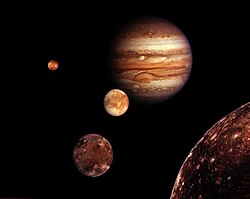Stephano (moon)
Stephano (/ˈstɛfənoʊ/ STEF-ən-oh) is a retrograde irregular satellite of Uranus. It was discovered by Brett J. Gladman, et al. in 1999, and given the provisional designation S/1999 U 2.[7][8][9][10][11]
Confirmed as Uranus XX, it was named after the drunken butler in William Shakespeare's play The Tempest in August 2000.[12]
The orbital parameters suggest that it may belong to the same dynamic cluster as Caliban, suggesting common origin.[13]

Uranus · Sycorax · Francisco · Caliban · Stephano · Trinculo

See also
References
- ^ Shakespeare Recording Society (1995) The Tempest (audio CD)
- ^ Benjamin Smith (1903) The Century Dictionary and Cyclopedia
- ^ Lessing (1914) How the Ancients Represented Death
- ^ "Planetary Satellite Mean Orbital Parameters". JPL/NASA. Retrieved 2024-10-28.
- ^ a b Sheppard, Jewitt & Kleyna 2005, p. 523, Table 3 ... ri (km) ... 16 ... i Radius of satellite assuming a geometric albedo of 0.04.
- ^ Graykowski, Ariel; Jewitt, David (2018-04-05). "Colors and Shapes of the Irregular Planetary Satellites". The Astronomical Journal. 155 (4): 184. arXiv:1803.01907. doi:10.3847/1538-3881/aab49b. ISSN 1538-3881.
- ^ Gladman, B. J.; Kavelaars, J. J.; Holman, M. J., Petit, J.-M.; Scholl, H.; Nicholson, P. D.; and Burns, J. A.; The Discovery of Uranus XIX, XX, and XXI, Icarus, 147 (2000), pp. 320–324
- ^ Marsden, Brian G.; Probable New Satellites of Uranus, IAUC 7230, 1999 July 27
- ^ Marsden, Brian G.; Probable New Satellites of Uranus, IAUC 7248, 1999 September 4
- ^ Marsden, Brian G.; S/1999 U 1, S/1999 U 2 and S/1999 U 3, IAUC 7385, 2000 March 24
- ^ Marsden, Brian G.; S/1999 U 2, IAUC 7473, 2000 August 5
- ^ Marsden, Brian G.; Satellites of Uranus, IAUC 7479, 2000 August 21
- ^ Grav, Tommy; Holman, Matthew J.; Gladman, Brett J.; and Aksnes, Kaare; Photometric survey of the irregular satellites,Icarus, 166 (2003), pp. 33-45. arXiv:astro-ph/0301016
- Sheppard, S. S.; Jewitt, D.; Kleyna, J. (2005). "An Ultradeep Survey for Irregular Satellites of Uranus: Limits to Completeness". The Astronomical Journal. 129 (1): 518–525. arXiv:astro-ph/0410059. Bibcode:2005AJ....129..518S. doi:10.1086/426329. S2CID 18688556.

